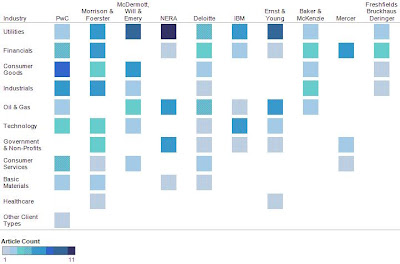Does this scenario sound familiar?
You’ve noticed a handful of clients asking questions about a particular issue - say healthcare clients concerned about counterfeit drugs and devices or consumer services clients wanting to become more “green”. Thinking about these requests you figure it would be a great idea to write an article or host a breakfast meeting on the issue, and you ask your marketing team to get on the case. And so follows a couple of weeks of activity behind the scenes to pull together and place an article on the issue you’ve identified.
The topic or industry may be different and the request might be for a whitepaper or a webinar - but in our experience this situation occurs time and again in professional services firms. In essence, a handful of anecdotal data points are used to trigger a chain of activities (and costs) that may or may not deliver tangible marketing ROI. We believe professional services firms need a more rigorous approach to thought leadership development.
Can you imagine a manager at Coke walking into a marketing manager’s office and saying “hey I just saw a bunch of folks giving away Pepsi t-shirts. We should give away Coke t-shirts”. You know that if the idea was given any kind of consideration it would first require drawing upon some in-depth market and competitive intelligence to determine the potential impact of giving away free t-shirts.
Professional services firms need to learn from other industries in beginning to build effective market and competitive intelligence capabilities. Effective intelligence would enable them to have answers to the kind of questions triggered by the partners request in the scenario above:
· What evidence is there that “green” is a significant issue for healthcare organizations?
· Are there other more critical issues we should be focusing on instead?
· Which clients have we already talked to about this issue?
· Do we have something interesting to say - a clear point of view or a call to action?
· Do we have viable solutions to this problem?
· What are our competitors saying and doing?
· Do we still have something interesting to say that’s different to what our competitors have said?
· Is an article the best way to communicate our insights to clients or should we run a seminar or both?
Answers to many of these questions are available to those that choose to seek them. For example, using publicly available information from firm websites the chart below shows the relative levels of “green” thought leadership material analyzed by industry that has been produced by the 10 firms most active in addressing “green” issues in 2008.

The chart suggests that, to date, discussion of green issues in the consumer services industry has been relatively light. This may be an opportunity - or an indication that this sector isn’t yet focused on the issue. This would suggest further exploration of client interest, or perhaps review of industry media coverage would be worthwhile before proceeding. Conversely if the focus had been on Utilities, it is clear this is a very hot topic and the firm would need to evaluate the significant amount of material already produced to determine how it can contribute something insightful and differentiated to its clients thinking.
This kind of analysis can be helpful in focusing or pushing back on new thought leadership ideas and in the process potentially eliminating tens of thousands of dollars worth of wasted time and expense. The real benefits however come from systematically gathering market and competitive intelligence in order to shape and drive strategic and marketing plans. Effective intelligence can help firms anticipate hot topics and emerging trends as well as spot “white space” opportunities. This in turn enables firms to build market leadership and often to sustain premium rates.
Intelligent thought leadership is as much about the intelligence that goes into selecting the topics as it about the know-how that goes into the thought leadership deliverable.
*****
Paul Gladen is President and Founder of Muzeview LLC a market and competitive intelligence firm focused on the professional services sector. Paul also authors the blog “The Big Sky View” which discusses strategy, marketing and innovation in professional services. Paul has 20 years experience in professional services including 14 years with Arthur Andersen where he was a partner in the Technology, Media and Communications Industry practice and a founding member of Andersen’s Center for Research & Innovation. Paul is a UK Chartered Accountant. Paul can be reached at 212.665.0797 or paul@muzeview.com


No comments:
Post a Comment